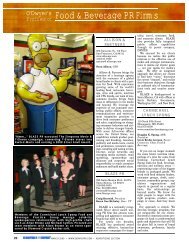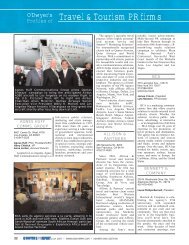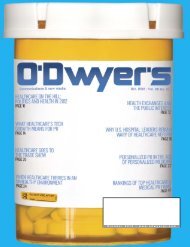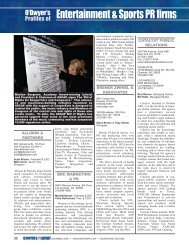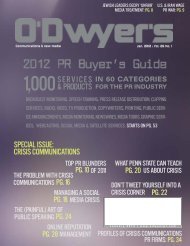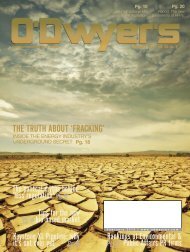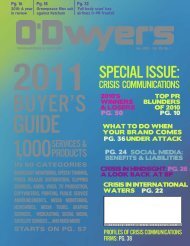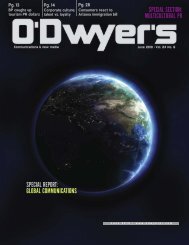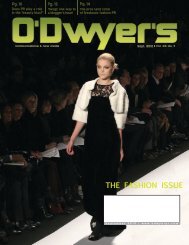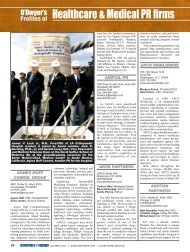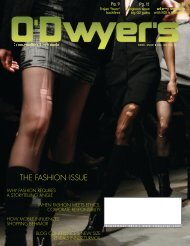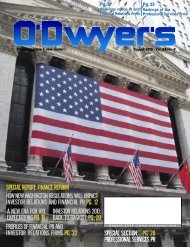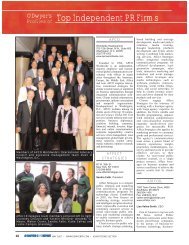Mar. '13 Food & Beverage PR Magazine (PDF) - Odwyerpr.com
Mar. '13 Food & Beverage PR Magazine (PDF) - Odwyerpr.com
Mar. '13 Food & Beverage PR Magazine (PDF) - Odwyerpr.com
You also want an ePaper? Increase the reach of your titles
YUMPU automatically turns print PDFs into web optimized ePapers that Google loves.
REPORT<br />
Why energy drinks aren’t ready for prime time<br />
Energy drinks, riding a wave of slick marketing and voracious consumer appetites<br />
for a pick-me-up, have grown into a $10 billion market seen by many as a bright<br />
spot in a wider beverage industry battered by obesity woes and flattened sales.<br />
However, showy titans like Red<br />
Bull and Monster Energy have<br />
appeared unprepared for a recent<br />
<strong>PR</strong> storm fueled by federal probes, media<br />
skepticism and lawsuits.<br />
In Washington, D.C., where federal<br />
agencies and lawmakers are poring over<br />
the energy drink market and the national<br />
zeitgeist increasingly is taking its cues,<br />
the <strong>com</strong>panies that market such beverages<br />
are now playing defense.<br />
“Their engagement level is lackluster<br />
at best,” said Rob Volmer, founder of<br />
D.C.-based Crosby~Volmer, the firm that<br />
helped Living Essentials put its nowubiquitous<br />
5-Hour Energy brand on the<br />
map in 2007. “What’s really missing here<br />
is any concrete Washington strategy. If<br />
there is a strategy, it’s not in tune with the<br />
realities of what’s in place and it’s <strong>com</strong>pletely<br />
reactionary.”<br />
Lawsuits and regulations<br />
Questions about ingredients and the<br />
<strong>com</strong>panies behind energy drinks trickled<br />
out in reports for years — Forbes ran a<br />
lengthy piece in early 2012 on the<br />
“Mystery Monk Making Billions with 5-<br />
Hour Energy” — but a lawsuit filed last<br />
fall put more reporters on the trail and<br />
sparked a flurry of scrutiny.<br />
The parents of a 14-year-old <strong>Mar</strong>yland<br />
girl who died in 2011 sued Monster in<br />
October 2012 alleging the product contributed<br />
to her death after she drank two<br />
24-ounce cans in the 24-hours before<br />
going into cardiac arrest.<br />
Days after the suit was filed, the <strong>Food</strong><br />
and Drug Administration said it was investigating<br />
reports of five deaths and a nonfatal<br />
heart attack that occurred after drinking<br />
Monster beverages. The suit accuses<br />
the <strong>com</strong>pany of failing to warn of the risks<br />
of its drinks.<br />
“Monster does not believe that its products<br />
are in any way responsible for the<br />
death of Ms. Fournier and intends to vigorously<br />
defend the lawsuit,” the <strong>com</strong>pany<br />
said. “The FDA has made it clear that it<br />
has not established any causal link<br />
between Monster Energy drinks and the<br />
reports it has received.”<br />
Monster relies on <strong>PR</strong> support from Los<br />
Angeles-based Pondel Wilkinson, which<br />
has handled investor relations for the publicly<br />
traded <strong>com</strong>pany that changed its<br />
By Greg Hazley<br />
name from Hansen Natural in January.<br />
Part of the uncertainty and even criticism<br />
can be attributed to a veil over the<br />
product sector. As an FDA director told the<br />
Times last fall, energy drinks are not<br />
defined by any regulation; the phrase is a<br />
“marketing term.” Monster for years classified<br />
its beverages as dietary supplements,<br />
a designation that ducked scrutiny<br />
by the FDA. While the <strong>com</strong>pany long held<br />
that the supplement designation had nothing<br />
to do with regulation — supplements<br />
have more freedom with<br />
ingredients but have to<br />
report adverse incidents<br />
to the FDA — it<br />
reversed course in mid-<br />
February and said it<br />
would embrace classification<br />
as a food, a status<br />
in line with Red Bull.<br />
The <strong>com</strong>pany also said it<br />
would add nutritional value<br />
information and ingredients to its cans.<br />
Established upstarts like Red Bull and<br />
Monster are not the only players in the<br />
game. PepsiCo’s Amp is the No. 4-selling<br />
energy drink, just ahead of Coca-Cola’s<br />
NOS beverage.<br />
The American <strong>Beverage</strong> Association,<br />
the trade group of beverage giants like<br />
PepsiCo and Coca-Cola (as well as new<br />
member Monster), says that energy drinks,<br />
like all food and beverages, are regulated<br />
by the FDA. A frequent stat offered by the<br />
ABA is that energy drinks contain half the<br />
caffeine of a similar size cup of coffee.<br />
D.C. support engaged<br />
With coverage and questions increasing,<br />
Red Bull North America and Monster for<br />
the first time hired lobbying help in<br />
Washington at the end of 2012 to help<br />
spread their message and influence policy<br />
discussions sparked by coverage of their<br />
products.<br />
Red Bull in November hired Heather<br />
Podesta + Partners to educate D.C. policymakers<br />
about their products, as well as<br />
Olsson Frank Weeda Terman Matz for<br />
counsel on regulation, according to federal<br />
filings.<br />
Monster turned to Podesta Group, the<br />
firm of Tony Podesta, Heather’s husband,<br />
in November after the FDA opened its<br />
probe. Monster also engaged Covington &<br />
Burling for Hill help. Volmer <strong>com</strong>mended<br />
the <strong>com</strong>panies on their choice of D.C. lobbying<br />
counsel, but questioned why it took<br />
so long. He said a lack of knowledge that<br />
the regulatory front was simmering, as<br />
well as a continued lack of third party<br />
advocacy for the industry has handicapped<br />
the drink makers’ attempts the manage the<br />
crisis.<br />
Volmer noted that scores of regulatory<br />
filings have been made since 2008, a harbinger<br />
of the regulatory tide pushing on the<br />
sector now.<br />
By mid-January, three Democratic lawmakers<br />
— Sens. Dick Durbin (Ill.) and<br />
Dick Blumenthal (Conn.), and Rep. Ed<br />
<strong>Mar</strong>key (Mass.) sent letters requesting<br />
information about<br />
ingredients to 14 <strong>com</strong>panies<br />
involved in<br />
marketing energy<br />
drinks, including<br />
Living Essentials,<br />
Monster <strong>Beverage</strong>,<br />
Red Bull, as well as<br />
beverage giants like<br />
PepsiCo, Coca-Cola<br />
and Dr Pepper Snapple.<br />
“Energy drink <strong>com</strong>panies need to<br />
be clear with consumers about what they<br />
think their product is, what it contains, and<br />
what it can do,” said <strong>Mar</strong>key. “The broad<br />
claims made by these products and their<br />
blurred classification in the marketplace<br />
make it difficult for consumers, particularly<br />
young consumers, to make informed<br />
decisions about their consumption.”<br />
[<strong>Mar</strong>key’s former press secretary Izzy<br />
Klein is on the Monster lobbying team at<br />
Podesta.]<br />
The lawmakers want to know the<br />
amounts of stimulants like caffeine and<br />
guarana in the drinks and whether the <strong>com</strong>panies<br />
consider their beverages food products<br />
or dietary supplements. They also are<br />
looking for studies that back up health<br />
claims made in the marketing of the products.<br />
Monster and other energy makers are<br />
quick to note that billions of the beverages<br />
have been sold and safely consumed for the<br />
past 25 years. Monster alone has sold eight<br />
billion cans of Monster Energy since 2002<br />
and is the No. 2 energy drink producer<br />
behind Red Bull, according to Bevnet.<strong>com</strong>.<br />
As one of the lawmakers investigating<br />
the industry, Blumenthal, a former attorney<br />
general of Connecticut, put it: “Energy<br />
drink makers are mistaken if they believe<br />
they have escaped regulatory oversight to<br />
safeguard consumer health.” £<br />
10<br />
MARCH 2013 4 WWW.ODWYER<strong>PR</strong>.COM



